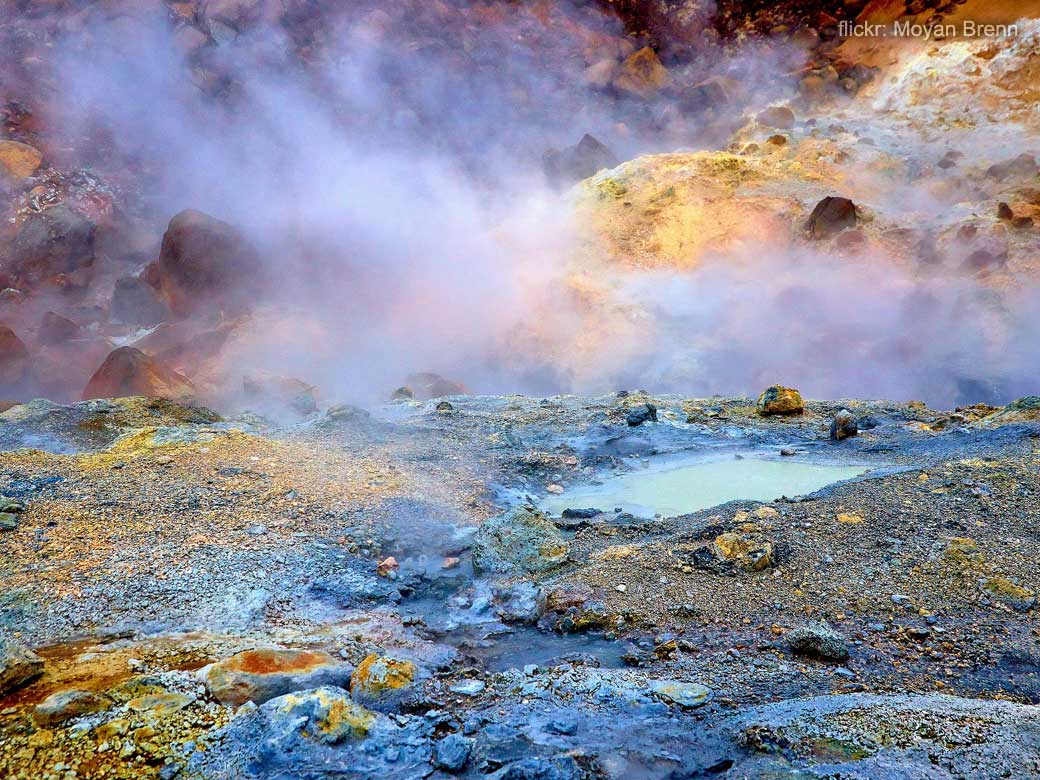Representing Iceland at the Embassy (Part 2 of 2)
Wed, Mar 29, 2017-
Tags
The similarities between Iceland and Japan
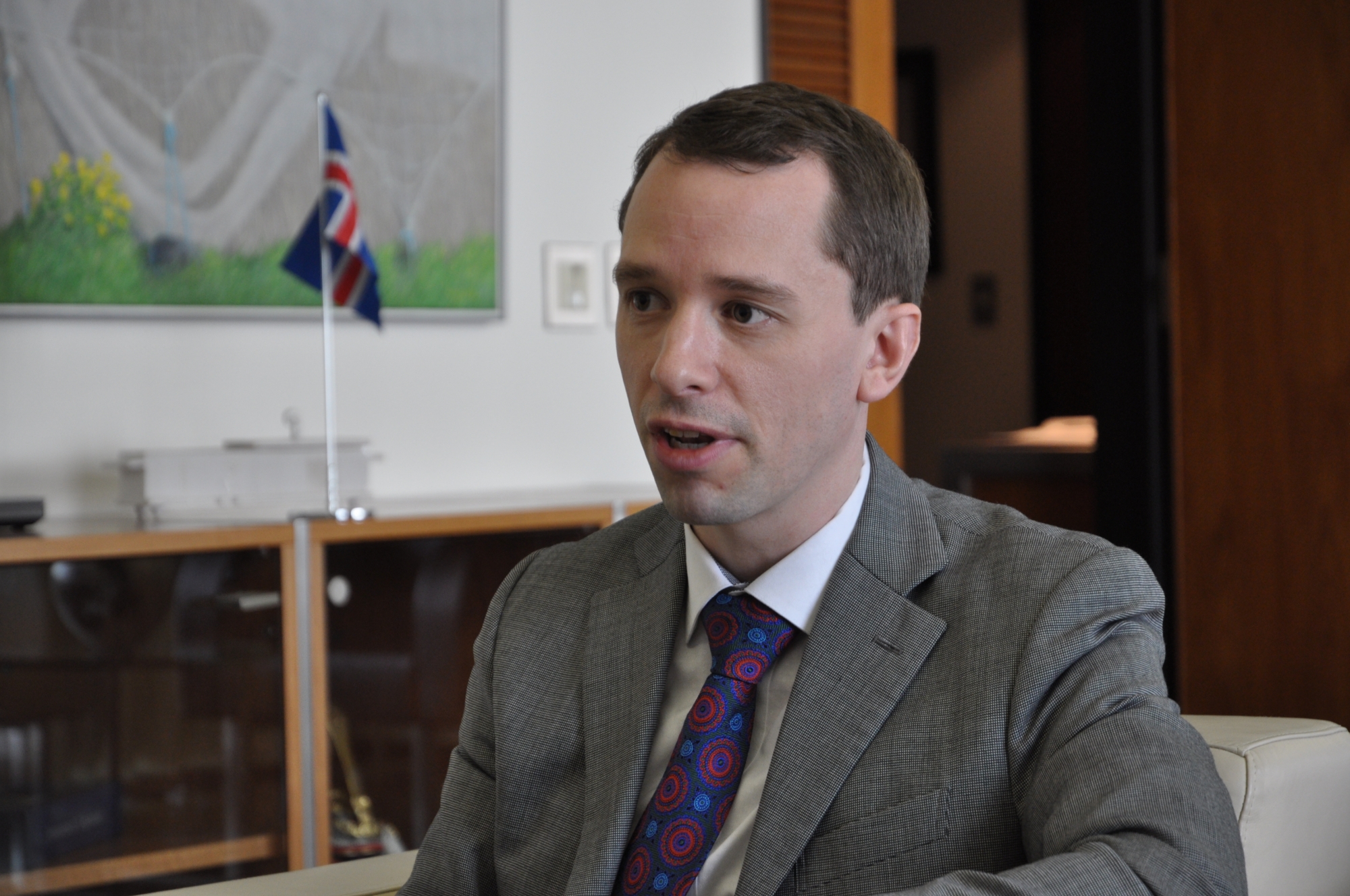
Hailing from Iceland, one of the happiest countries in the world according to the 2017 World’s Happiness Report, Halldór Elís Ólafsson, a 2010 GSAPS* graduate, is currently the Deputy Management Officer for the Embassy of Iceland and Secretary General of the Icelandic Chamber of Commerce in Japan. In Part 2, Halldór discusses what his job entails and the relationship between Iceland and Japan.
A day in a life of an embassy employee
“To be able to say that I am a Waseda graduate is fantastic,” Halldór says. “When I go around town meeting Japanese businessmen and bureaucrats, the name Waseda comes up quite a lot. It’s a great conversation starter. There is an older gentleman on the Icelandic Chamber of Commerce who is a Waseda alumnus, demonstrating the threads of Waseda being all over the place. They go quite deep, woven into business and politics in Japan.”
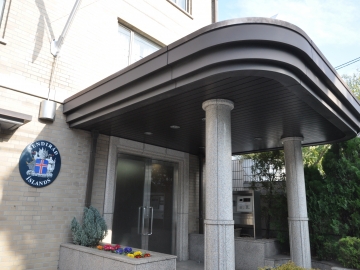
The Embassy of Iceland in Tokyo
As an embassy employee, Halldór’s mission is to protect Icelandic interests. “Our main goal is to firstly help Icelandic citizens and companies here in Japan. There is a growing Icelandic population, totaling to about 80. In fact, after Luxembourg, Iceland is the country with the highest number in terms the percentage citizens studying or living abroad. However, a large number of them come back, so there is no real brain drain. Through the Embassy’s wide network, we provide Icelandic people with access to other chambers, councils and the foreign business community in Japan. At the moment, we handle the Secretariat of the Chamber of Commerce and are quite involved in running the Chamber. For small embassies like ours, it is very important to have that direct connection in terms of any kind of logistics, information, networks and so forth.”
Similarities and cooperation between Iceland and Japan
To be more specific, Japan is the biggest export market of Icelandic products in whole of Asia and has been for the last 30, 40 years. 80% of this is seafood, mainly unprocessed fish. Though they may be processed elsewhere like China, the end market is usually in Japan. “There is a larger part the Embassy plays which is focused on business and providing an open business environment for Icelandic businesses. Part of my duties includes making it easier for Icelandic companies to establish business partnerships in Japan.” The second largest is the trade in services, or tourism, which has grown quite a lot in the last ten years, from 1 or 2,000 Japanese tourists visiting every year to now approximately 23,000. This is comparable to the number of tourists visiting the Baltic States.
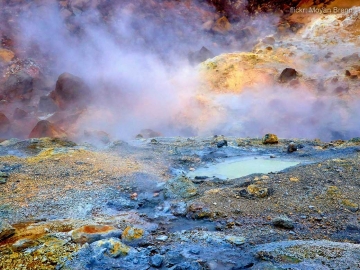
Iceland is a very volcanic country, like Japan
Furthermore, sales of Icelandic know-how in geothermal energy are also increasing. “There is a great deal of similarities between Iceland and Japan in a sense that they are both very volcanic countries. We are both blessed and cursed with having so much geological activities. In Iceland, we are fortunate that this gives us hot water. As the name suggests, Iceland is pretty cold, so we use the hot water to heat our houses and buildings, and melt snow on the streets. There are large eruptions that can put the country and sometimes even Europe to a standstill, as exemplified by the Eyjafjallajökull in 2010. And, we have earthquakes, too. This marries Iceland and Japan together in terms of disaster preparedness, and there is a lot to learn from each other.”
Another similarity between Iceland and Japan is that both countries were very isolated for a long period of time, which had a huge impact on society. “Iceland is a homogeneous society that is trying to understand our part in the world in the midst of globalization. Where do we want to fit in? What do we have to offer? Where do we stand? Iceland is trying to pin this down by demonstrating great examples in gender equality, business and fisheries policies (we have training programs for developing countries to hone their skills in the fishing industry). These are couple of thematic areas which Iceland and Japan share quite a lot.”
What’s more, there is quite a lot of academic cooperation between Iceland and Japan. “Many Icelandic students obtain their doctorates and Master’s degrees here in Japan. Additionally, I believe only the University of Iceland has about 10 to 15 bilateral agreements with universities in Japan, Waseda being one of them. Japanese is still the second most popular foreign language taught in Iceland after English. The amount of students studying in the Japanese department at the University of Iceland has reached a very solid number, so we now have a good turnover of students finishing school and then going onto to do something more with Japan, whether it be graduate studies or work. Therefore, the Embassy is quite involved with creating an environment for academic exchange by helping with agreements. We are currently planning programs for Japanese who want to study in Iceland other than the Icelandic language. I’m confident to say that Japanese students who come to Iceland will fall in love with the country and the people.” The Embassy is also working to establish a working holiday agreement between Iceland and Japan in the future.
Iceland changing for the better
Lastly, Halldór says the following on his country: “Iceland has been very fortunate because we were very isolated in the North Atlantic with no real access to markets for a long time. After WWII, we started building our fishing industry, developing the city and improving our agriculture, making a big leap between the 60s and 80s in living standards of Icelandic people. It has dramatically changed over the last few years. We have grown tremendously over the last two decades in terms of GDP per capita, literacy rates, education, child mortality rates and other indicators which measures how good a society is. From being very poor to very advanced and prosperous, it is not a very long time, just one generation. Not to mention that people like to be associated with Iceland because we have been trying to champion some of the issues we believe in, such as gender equality. Iceland may be small, but we can very quick to adapt and change our general view on a subject in a very short time.”
To go back to Part 1, click here.
The Graduate School of Asia-Pacific Studies
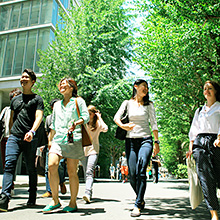 *The Graduate School of Asia-Pacific Studies (GSAPS) is one of the few educational institutions in the world that offers an interdisciplinary International Relations program which trains students in three specializations: Area Studies, International Relations and International Development/Policy Studies. As part of the vibrant and diverse GSAPS community, students are able to experience a microcosm of the global society as they pursue a range of curricular and research activities. Learn more about what other GSAPS alumni are doing here.
*The Graduate School of Asia-Pacific Studies (GSAPS) is one of the few educational institutions in the world that offers an interdisciplinary International Relations program which trains students in three specializations: Area Studies, International Relations and International Development/Policy Studies. As part of the vibrant and diverse GSAPS community, students are able to experience a microcosm of the global society as they pursue a range of curricular and research activities. Learn more about what other GSAPS alumni are doing here.
Did you know…?
“Iceland has had very good track record in general gender equality in the workplace, in the business community, in the work environment in Iceland. There is no country as close to having gender parity in terms of pay. Iceland is very happy to make this a priority. Of course, Scandinavia has been at the forefront of gender equality for many, many years. Countries like Sweden, Denmark, Norway and Finland. And then Iceland, we like to consider our leaders in gender equality, but this is not something you just teach. You can’t tell people how to do it. Every arch for gender equality of each country will probably be very different because every country has to deal with their own sort of difficulties with having a gender equal or having an equal society. What we can do is let people know about good practices that we have implemented. The gender equality program in Iceland is focused on developing countries. It is part of our development aid, sort of a funding for that program. It has been shown in research that the more equal the society is, when it comes to gender and race, the more you will prosper. That is a big, important message that we will help to push.
We had a democratically elected female president, and we also had he first lesbian prime minister. So, we have been very fortunate to have people be open about their sexuality, and if it helps the dialogue to evolve, not just in Iceland but all over the world, I think Icelandic people are very happy to break the ice.”


